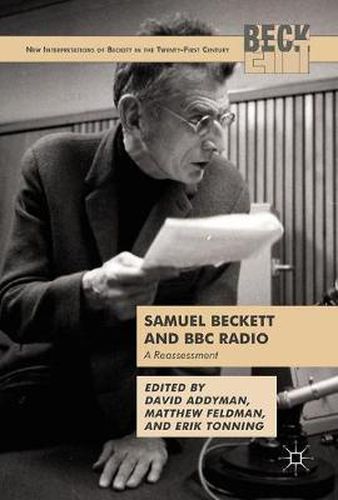Readings Newsletter
Become a Readings Member to make your shopping experience even easier.
Sign in or sign up for free!
You’re not far away from qualifying for FREE standard shipping within Australia
You’ve qualified for FREE standard shipping within Australia
The cart is loading…






This title is printed to order. This book may have been self-published. If so, we cannot guarantee the quality of the content. In the main most books will have gone through the editing process however some may not. We therefore suggest that you be aware of this before ordering this book. If in doubt check either the author or publisher’s details as we are unable to accept any returns unless they are faulty. Please contact us if you have any questions.
This book is the first sustained examination of Samuel Beckett’s pivotal engagements with post-war BBC radio. The BBC acted as a key interpreter and promoter of Beckett’s work during this crucial period of his getting known in the Anglophone world in the 1950s and 1960s, especially through the culturally ambitious Third Programme, but also by the intermediary of the house magazine, The Listener. The BBC ensured a sizeable but also informed reception for Beckett’s radio plays and various adaptations (including his stage plays, prose, and even poetry); the audience that Beckett’s works reached by radio almost certainly exceeded in size his readership or theatre audiences at the time. In rethinking several key aspects of his relationship with the BBC, a mix of new and familiar Beckett critics take as their starting point the previously neglected BBC radio archives held at the Written Archive Centre in Caversham, Berkshire. The results of this extended reassessment are timely and, in many cases, quite surprising for readers of Beckett and for scholars of radio, late modernism, and post-war British culture more broadly.
$9.00 standard shipping within Australia
FREE standard shipping within Australia for orders over $100.00
Express & International shipping calculated at checkout
This title is printed to order. This book may have been self-published. If so, we cannot guarantee the quality of the content. In the main most books will have gone through the editing process however some may not. We therefore suggest that you be aware of this before ordering this book. If in doubt check either the author or publisher’s details as we are unable to accept any returns unless they are faulty. Please contact us if you have any questions.
This book is the first sustained examination of Samuel Beckett’s pivotal engagements with post-war BBC radio. The BBC acted as a key interpreter and promoter of Beckett’s work during this crucial period of his getting known in the Anglophone world in the 1950s and 1960s, especially through the culturally ambitious Third Programme, but also by the intermediary of the house magazine, The Listener. The BBC ensured a sizeable but also informed reception for Beckett’s radio plays and various adaptations (including his stage plays, prose, and even poetry); the audience that Beckett’s works reached by radio almost certainly exceeded in size his readership or theatre audiences at the time. In rethinking several key aspects of his relationship with the BBC, a mix of new and familiar Beckett critics take as their starting point the previously neglected BBC radio archives held at the Written Archive Centre in Caversham, Berkshire. The results of this extended reassessment are timely and, in many cases, quite surprising for readers of Beckett and for scholars of radio, late modernism, and post-war British culture more broadly.